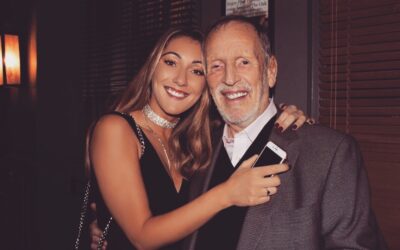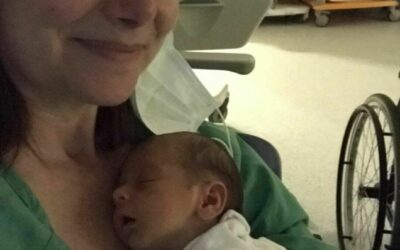From blurred vision to paralysis in 48 hours
Phil Morgan tells us about his experience with a rare variant of GBS known as Miller Fisher
My mysterious illness began on June 14th, 2016. I started to notice my eyesight was becoming affected during the morning of that day. I found it difficult to focus and felt quite dizzy. I made a trip to see my optician late that morning as something was definitely not quite right. They detected nothing unusual but I went away a little unconvinced. Things got worse and I decided to get myself to see my GP later that day. Within hours I had severe double vision and felt very disorientated. The GP told me to go straight to A&E after a brief check with what looked like a bright torch into my eyes.
After a long wait to see a doctor at the hospital in A&E and some routine questions and checks, I was sent home around midnight that same day. I got a taxi but yet again I felt very concerned. Soon after getting home the A&E department had had second thoughts. I received a phone call and lucky for me was asked to return to undergo a CT scan. They suspected something but I was not sure what at this stage. I waited in a hospital bed for most of the night while the CT scan staff prepared the machine. The test eventually revealed nothing. I was taken to a bed in the stroke ward at Halifax and Calderdale Hospital where I was monitored for that following day.
The next day my condition was changing. I spent a number of hours in the hospital bed noticing a slow deterioration to my speech, lip movement and ability to swallow. I also begun to feel pins and needles in my hands. Jan, my partner had arrived by now and she went to discuss the symptoms with the staff nurse. At this time neither the doctor on call or staff nurse had a diagnosis other than the stroke consultant suggesting that it was stress, and I should go home as he could not help.
Jan and I know there was something much more serious going on and asked for a second opinion. Lucky for me, Jan was previously a nurse and because of this she was determined to get a correct diagnosis as I lay in bed feeling quite anxious. My eyes had became very sensitive to light and I had already asked Jan to bring my sunglasses into hospital. My pupils had become fully dilated and my eyes were struggling to deal with daylight in the room. I also needed help to get up to the bathroom as my leg had become very weak and I had real difficulty moving without help. Within 24 hours I could not move my head and legs and my arms had become weak. I was in a state of “undiagnosed limbo”
After various visits from doctors, consultants and nurses at my bedside the next day I was taken for a MRI scan. The magnetic pulse “bangs” all around my head, which was fitted inside a glass helmet were extremely discomforting to me under the circumstances. These tests are pretty awful even with all your facilities! Later on that day I found that the scan revealed nothing which was a good thing, but it did mean the undiagnosed limbo continued.
The evening of the second day in hospital, I was relieved to have a visit from a consultant neurologist and he carried out some basic reflex tests to my arms and feet. They didn’t react all, I had no reflexes and at this stage a diagnosis was made. I had Miller-Fisher syndrome which is a rare variant of Guillain-Barre syndrome. A blood test was taken before the decision to administer immunogloblins (antibodies) was given to treat my condition. I had not heard of this illness at all before, Jan had heard of Gullain-Barre but not this rare form. We were both very worried and Jan knew as it turned out how long it can take to overcome this illness.
I could no longer support my head, my eyes were closed and wouldn’t open, I couldn’t talk, had no ability to move my head, had limited movement to my arms, no grip and my legs were heavy and difficult to move. I had become almost paralysed within 48 hours. I later found out that Miller Fisher was a very rare syndrome which is only seen in 1 in 1,000,000. The neurologist had never seen this variation before, but had experience of Guillain-Barre, the more widely known syndrome, which, is a paralysis which starts in the limbs rather than the eyes (in my case). Both are similar and both can cause paralysis to the whole body. The big question at this time which I needed to know was, am I likely to get better?
I was told that it was possible to make a full recovery. I tried to believe this and tried to stay positive. By this time, I was very tired as I had not slept for 48 hours but was not likely to get any sleep that night either. My normal function to swallow wasn’t naturally occurring. This simple function we all do much more often than we think was causing me some distress. The saliva built up in my mouth, had nowhere to go and I had to sit forward all night which was pretty gross! Jan requested a doctor to have another look at my condition and in the small hours of the night it was decided I had to agree to a tracheostomy. It was my worst nightmare as I really didn’t wasn’t this, but had no choice. I was quickly put to sleep with an injection and woke in a brightly lit room. I seemed comfortable at first as I came out of the anaesthetic and slowly regained my memory of events.
I came around fully and felt like everything was hurting as I heard the assisted breathing machine pump on my left working away to assist my lungs. My diaphragm had become paralysed and the tracheostomy allowed to breath. I had a feeding tube into my nose and a catheter downstairs, so was fully plumbed in. I wasn’t going anywhere, even if I wanted to! My eyelids were fixed shut and I had no vision but fortunately I had slight movement in my arms but only a fraction of my previous strength. It was a real struggle to deal with the shock of this new situation and I felt as if the adrenaline was pumping. I used what movement I had in my right hand to communicate by writing/scrawling.
I was administered immunoglobulins over three days at a high dose. The doctor had decided this was necessary as my condition had got significantly worse in the first days. It is normally provided over a longer period and at a lesser dose.
Immunoglobulins are given to counteract and stop the spread of the illness. The illness is a result of my immune system deciding that my peripheral nervous system should be attacked. The attack on my nervous system had eroded the myelin sheath cover which surrounds the nerves. Arrival of signals to my muscles and senses was no longer happening, so causing paralysis. The immunoglobulins seemed to stop my paralysis becoming total.
I was by now experiencing some pretty horrendous pain as you can imagine. My nervous system was under attack which meant I had a cocktail of painkillers at regular times throughout the day. In fact, I asked for pain relief every few hours, but was told I had received the maximum regularly throughout my stay in hospital. My tracheostomy was also a real challenge to maintain and initially the nurses had to assist with this maintenance. Without going into detail, it was a pretty disgusting piece of equipment but I couldn’t do without it. Over the next few days while lying in bed I was regularly testing my movement. I could move my hands and had slight movement in my toes which ever so gradually improved. I managed somehow to make very slow improvements.
Visits from family, friends and work colleagues gave me a great deal of support and gradually I started to regain slightly more movement as this first week in intensive care passed. I did however take a turn for the worse as I contracted a chest infection and had to have a course of antibiotics which did make my health more perilous. I struggled through and progress was slow. The consultant neurologist, a Doctor Henderson decided that a new course of action was required. After making contact with other specialists in this field he prescribed plasmapheresis. He wanted my decline into Miller Fisher to be stopped as soon as possible.
After I had a central line fitted to a main artery at my shoulder blade, the dialysis nurse visited with the mobile equipment required to carry out the treatment. My blood was removed and spun in a centrifuge to remove the plasma and then new plasma was added in the process. This went on for what seemed like a couple of hours and made me very tired and so I usually slept for a good while afterwards. This was done over a period of two weeks. I had seven plasma exchanges over that two weeks which floored me completely. By now my blood was renewed and this did make an improvement on my condition and so began to make very slow improvements. Over the days following the treatment I began to get some movement back, and one of my eyes slowly started to open. The improvements occurred at a snail’s pace as the covering to my nerves was regenerating. I had now been in the intensive care ward for around four weeks and I was convinced that I could get myself back to where I was before this nightmare started.
As the days rolled into weeks, I managed to sit up in bed more easily and had partial sight, if a little blurred in one eye. My sight was affected quite badly and even to date has not fully recovered. I had a daily physiotherapist who visited me and encouraged me to perform varying degrees of movement until I could eventually manage to take the weight of my head again with my neck muscles. This improvement was a big milestone in my recovery as not being able to do this caused me much discomfort. In time I began to sit in a bedside chair and eventually stand and then walk again!
During the whole ordeal, I was left with one ability which I never lost. I was lucky that I did manage to communicate by writing or should I say scribbling which formed my only means of communication. The struggle to get back to normal continued for the following months. I was now able to maintain my own tracheostomy which was good. Clearing “the plumbing” as I called it was necessary. Over the next few weeks I slowly improved in the intensive care ward. I eventually took a shower and was able to sit in bed watching television (with partial sight). It was decided after two months that I was to be transferred to Huddersfield HRI. I stayed in my local hospital for three weeks and continued to make slight improvements. By the end of my stay there I could walk and exercise daily on my own. I was up and about getting to the bathroom and taking a shower on my own. I had my tracheostomy and feeding pipe removed, more steps towards my independent recovery. Breathing without the tube felt good and I managed to maintain my airway. Swallowing on the other hand was another story. The muscles in my throat and tongue were affected for some time and as there are numerous nerves in the face, it took a long time to get get these working properly. As soon as I could swallow water and liquidized food I was able to leave the hospital. The real recovery now began, without the support provided by the NHS. At home, I maintained my pain medication and continued with facial exercises to get my full movement back. I even started a regular full body yoga regime! My ability to eat and talk had been severely affected but over the months at home I made steady progress. Soup slowly tuned to solid food and chewing was now an option and the sensation of tasting food again felt like a miracle. In fact, the whole recovery seemed miraculous!
I eventually came back to work on phased return approximately six months on from contracting this illness. The recovery however, still continues. Facial spasms persisted for up to twelve months and now I can just about whistle again(!) and feel extremely lucky to have gained an almost full recovery. I still have the pins and needles in my hands and I have to wear spectacles full time as well.
I feel like my face doesn’t quite work how it did but I am lucky, very lucky and living proof that is possible to come from such a debilitating illness to almost full recovery! If you are recovering from Miller Fisher or you know someone who has this illness, it is one of the hardest journeys but never give up hope, you will get there!
Phil’s Slei Gill and Booze Moor walk for GAIN
Walking 10 miles in the Yorkshire Dales for Guillain-Barre & Associated Inflammatory Neuropathies (GAIN) because I can walk again!
Miller Fisher syndrome is a terrifying illness that required a couple of months in intensive care and many months recovering at home, struggling to regain the power to do normal everyday things. At my worst I was on life support, paralysed from my chest up with severe weakness in my limbs. My pupils were fixed and dilated so maximum light was entering my eyes for months on end.



